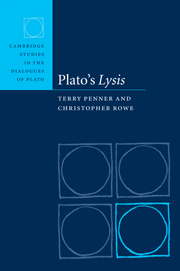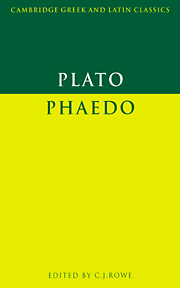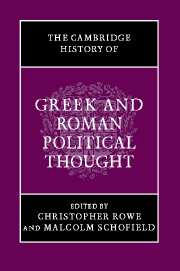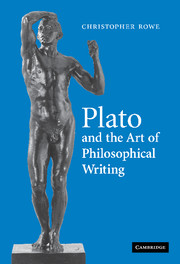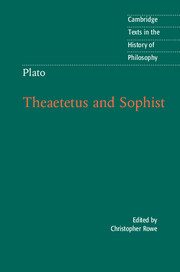Plato's Lysis
AUD$66.32 exc GST
Part of Cambridge Studies in the Dialogues of Plato
- Authors:
- Terry Penner, University of Durham
- Christopher Rowe, University of Durham
- Date Published: March 2009
- availability: Available
- format: Paperback
- isbn: 9780521103190
AUD$
66.32
exc GST
Paperback
Other available formats:
Hardback, eBook
Looking for an inspection copy?
Please email [email protected] to enquire about an inspection copy of this book
-
The Lysis is one of Plato's most engaging but also puzzling dialogues; it has often been regarded, in the modern period, as a philosophical failure. The full philosophical and literary exploration of the dialogue illustrates how it in fact provides a systematic and coherent, if incomplete, account of a special theory about, and special explanation of, human desire and action. Furthermore, it shows how that theory and explanation are fundamental to a whole range of other Platonic dialogues and indeed to the understanding of the corpus as a whole. Part One offers an analysis of, or running commentary on, the dialogue. In Part Two Professors Penner and Rowe examine the philosophical and methodological implications of the argument uncovered by the analysis. The whole is rounded off by an epilogue of the relation between the Lysis and some other Platonic (and Aristotelian) texts.
Customer reviews
Not yet reviewed
Be the first to review
Review was not posted due to profanity
×Product details
- Date Published: March 2009
- format: Paperback
- isbn: 9780521103190
- length: 384 pages
- dimensions: 229 x 152 x 22 mm
- weight: 0.56kg
- availability: Available
Table of Contents
Preface
Part I. An Analysis of the Lysis:
1. 203AI–207B7: the cast assembles and the main conversation is set up
2. 207B8–210D8 (Socrates and Lysis): do Lysis' parents really love him?
3. 210EI–213C9: Socrates and Menexenus - how does one get a friend?
4. 213DI–216B9: Socrates and Lysis again, then Menexenus - poets and cosmologists on what is friend of what (like of like: or opposite of opposite?)
5. 216CI–221D6: what it is that loves, what it really loves and why
6. 221D6–222B2: the main argument reaches its conclusion
7. 222B3–E7: some further questions from Socrates about the argument, leading to (apparent) impasse
8. 223AI–B8: the dialogue ends - people will say that Socrates and the boys think they are friends, but they haven't been able to discover what 'the friend' is
9. 203AI–207B7 revisited
Part II. The Theory of the Lysis:
10. A rereading of the Lysis: some preliminaries
11. A rereading of the Lysis
12. On seeking the good of others independently of one's own good
and other unfinished business
Epilogue
Translation of the Lysis
Bibliography
Indexes.
Sorry, this resource is locked
Please register or sign in to request access. If you are having problems accessing these resources please email [email protected]
Register Sign in» Proceed
You are now leaving the Cambridge University Press website. Your eBook purchase and download will be completed by our partner www.ebooks.com. Please see the permission section of the www.ebooks.com catalogue page for details of the print & copy limits on our eBooks.
Continue ×Are you sure you want to delete your account?
This cannot be undone.
Thank you for your feedback which will help us improve our service.
If you requested a response, we will make sure to get back to you shortly.
×
